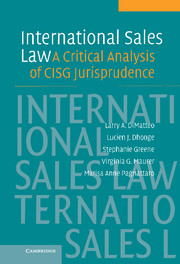Book contents
- Frontmatter
- Contents
- Preface
- Acknowledgments
- 1 INTRODUCTION
- 2 CISG METHODOLOGY AND JURISPRUDENCE
- 3 FORMATION: WRITING REQUIREMENTS
- 4 FORMATION: OFFER AND ACCEPTANCE RULES
- 5 OBLIGATIONS OF BUYERS
- 6 OBLIGATIONS OF SELLERS
- 7 COMMON OBLIGATIONS OF BUYERS AND SELLERS
- 8 BREACH OF CONTRACT BY SELLER
- 9 BREACH OF CONTRACT BY BUYER
- 10 DAMAGES, EXCUSE, AND PRESERVATION
- 11 SUMMARY AND OBSERVATIONS
- TABLE OF AUTHORITIES AND CASES
- APPENDIX A: UNITED NATIONS CONVENTION ON CONTRACTS FOR THE INTERNATIONAL SALE OF GOODS (CISG) (APRIL 11, 1980)
- APPENDIX B: CISG: TABLE OF CONTRACTING STATES (AS OF FEBRUARY 8, 2005)
- Index
10 - DAMAGES, EXCUSE, AND PRESERVATION
Published online by Cambridge University Press: 06 August 2009
- Frontmatter
- Contents
- Preface
- Acknowledgments
- 1 INTRODUCTION
- 2 CISG METHODOLOGY AND JURISPRUDENCE
- 3 FORMATION: WRITING REQUIREMENTS
- 4 FORMATION: OFFER AND ACCEPTANCE RULES
- 5 OBLIGATIONS OF BUYERS
- 6 OBLIGATIONS OF SELLERS
- 7 COMMON OBLIGATIONS OF BUYERS AND SELLERS
- 8 BREACH OF CONTRACT BY SELLER
- 9 BREACH OF CONTRACT BY BUYER
- 10 DAMAGES, EXCUSE, AND PRESERVATION
- 11 SUMMARY AND OBSERVATIONS
- TABLE OF AUTHORITIES AND CASES
- APPENDIX A: UNITED NATIONS CONVENTION ON CONTRACTS FOR THE INTERNATIONAL SALE OF GOODS (CISG) (APRIL 11, 1980)
- APPENDIX B: CISG: TABLE OF CONTRACTING STATES (AS OF FEBRUARY 8, 2005)
- Index
Summary
Upon breach by either party, a number of consequences result that are common to buyers and sellers. The CISG provides a series of procedures that impact the consequences of breach. First, it provides rules for the calculation of damages. Second, it provides a number of limiting doctrines that may be used to reduce the amount of damages awarded. Third, it provides the excuse of impediment that allows the breaching party to avoid damages. Fourth, it provides rules for the consequences of contractual avoidance. Finally, it allocates certain obligations pertaining to the preservation of goods.
CALCULATION OF DAMAGES: ARTICLES 75 AND 76
Articles 74, 75, and 76 set out general formulas for the calculation of damages. Pursuant to Article 74, damages consist of a sum equal to the loss, including loss of profit, suffered by the other party as a consequence of the breach. Under Article 75, if the contract is avoided, and the buyer has bought goods in replacement or the seller has resold the goods, the party claiming damages may recover “the difference between the contract price and the price in the substitute transaction.” The substitute transaction must be made in a reasonable manner and within a reasonable time after avoidance. If the substitute transaction occurs in a different place from the original transaction or is on different terms, the amount of damages must be adjusted to recognize any increase in costs, less any expenses saved as a consequence of the breach.
- Type
- Chapter
- Information
- International Sales LawA Critical Analysis of CISG Jurisprudence, pp. 151 - 162Publisher: Cambridge University PressPrint publication year: 2005

